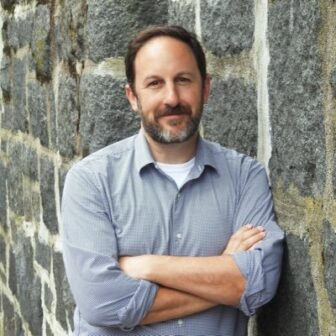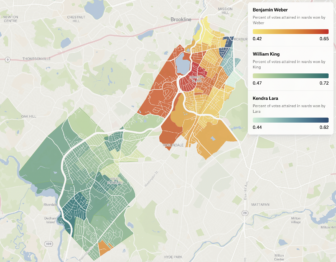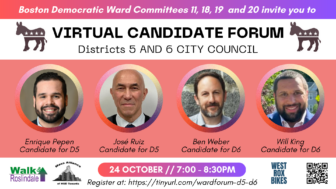Last updated on March 21, 2022
Jamaica Plain resident Sam Montaño is running to be the next 15th Suffolk District state representative. Montaño, 32, answered questions about affordable housing, racial equity, community organizing, and more.

Q: Why did you decide to run for the 15th Suffolk District state representative seat?
Montaño: I have been involved in JP as a community organizer for seven years. Once I moved to JP I immediately delved into the community; I ran for the JP Neighborhood Council and won a seat, I volunteered to mentor youth at Hyde Square Task Force, I participated in the JP/Rox planning process and advocated for affordable housing as a community member and through my work, I helped bring a youth center back to Mildred C. Hailey Apartments. In these roles we have been able to make change, but we still run into barriers that prevent us from really changing the systems that have prevented folks from thriving and staying in this district. I am running to take my lived and learned experiences to the state house to work for the systemic change we need with our community.
Q: How long have you lived in Jamaica Plain?
Montaño: I have lived in JP for 7 years.
Q: What are your pronouns?
Montaño: I use She/They. I use “she” because I identify as a woman and I use “they” because the way I present and feel most myself is outside the binary of gender as a common social construct.
Q: What’s your experience with the State House and legislation?
Montaño: With the community I have worked to bring legislation from the state house to the people. From helping to deconstruct bills and supporting people as they advocate for changes in their community to changing bills to better suit community needs. I have also testified on behalf of several bills related to rent stabilization, Universal basic income, and credit reform as people try to build generational wealth. In addition, I have worked with our state reps and senator to release funding for affordable housing and build support for affordable housing projects in the district.
Q: What do you think of the redistricted 15th Suffolk District? How is it different from before?
Montaño: I think it’s great that almost all of JP is together as a district now. Our website, samforboston.com has a map that shows the new district. It’s pretty different in that what were two different representative seats are now one. There are also fairly strong differences in what is happening across the district, though we are one neighborhood. I am looking forward to connecting across JP and making sure folks know about the changes.
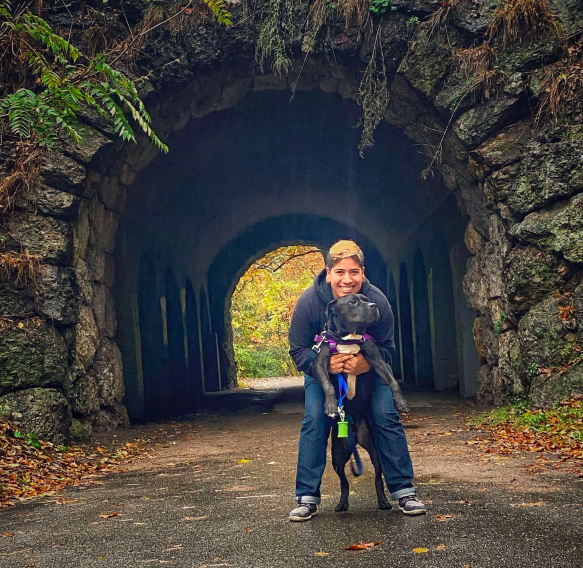
Q: On your website you write that you’ve focused on issues of affordable housing, equity, and climate change. Will you please be specific on how you’ve focused on those issues?
Montaño: Sure! I have worked as a community organizer at JPNDC through several roles. I was a resident organizer, working primarily in Hyde/Jackson Square and in what was Bromley Heath and is now Mildred C. Hailey. In those roles I supported and organized with residents for public safety improvements and with youth in Mildred Hailey to bring a youth center back. The mural on Centre St, I think it’s 297 Centre, is a project we did together. I also served on the Impact Advisory Group for the Pine Street Inn project on Washington St where I pushed for more affordability and homes for people. I have also served as chair of the JP Neighborhood Council where I frequently advocated for more affordable housing projects and developments as well as small business licenses and applications.
I have deeply committed to racial equity. I co-led the racial equity process at JPNDC and was able to host conversations and make changes in our hiring and employee practices. I pushed us to use a racial equity lens in all our work and codify the way we would prioritize racial equity in how we talk about our work. In addition, I have worked to make sure our public testimony and the way we do our advocacy prioritizes those who have been historically oppressed. I lead with this lens in my roles across the district as well.
I prefer to use “environmental justice” when discussing climate change. It centers the responses we need to make in order to prioritize folks who we know will be greatly impacted by the changing climate. I am currently the Director of Organizing at GreenRoots, an EJ organization in Chelsea and East Boston. There I supervise seven staff as they organize and lead in those communities. We work to help address the environmental burdens we have imposed on communities of color, those who don’t speak English as a primary language, and low income folks. Our work centers people in the way we make changes to address our rapidly evolving climate. There are many environmental reparations to be made, even in a place as green as JP. We need to make the switch away from gas to electricity, in parts of JP there is not enough green canopy and that makes it much hotter and puts vulnerable populations at risk for health related issues as well as not being able to afford their bills to stay cool or warm. There are access issues to transit and how often our buses run or even if folks can afford them. All this work comes together under an intersectional lens that bridges with the other priorities we have identified in this district.
Q: When talking about being a community organizer, you list grilling for the Mildred Hailey and South Street developments, dancing at Porchfest and Salsa in the Park, and serving families at the Nate Smith House. How will these experiences help you be a state representative?
Montaño: Part of being a community organizer is showing up for your community. These examples show the ways I have shown up and participated in the everyday events JP hosts and loves. In addition to participating in these events I was involved in the outreach and planning for many of them. These events allow you to build relationships in the community and talk to people who live in our community. It is at these events that I learned from our community. I learned the history of JP, of the organizing, of the work that has been done, of the dreams that people have. Being a state rep without these connections is impossible.
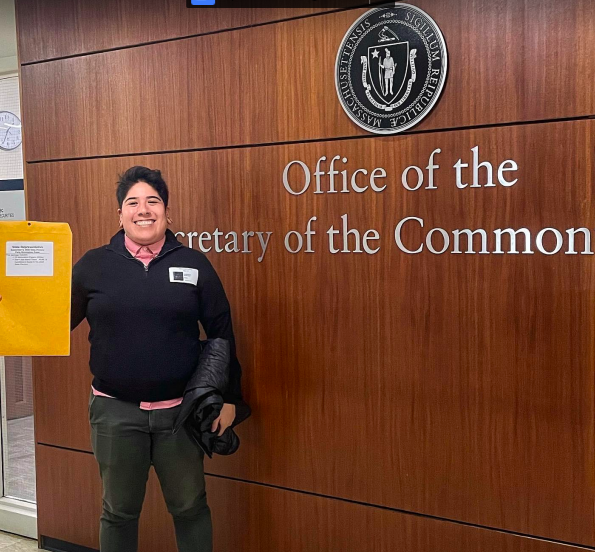
Q: Tenant protections are at the center of your platform. How would you accomplish providing more tenant protections?
Montaño: I would like to get rent stabilization passed, I would like to move forward no-fault eviction sealing and CORI sealing for renting and qualifying for affordable housing, I would like to finalize tenant right to representation, I want to look at the way we use credit scores in getting apartments as well as if we can use on time rent payments toward building credit score. I also want to look at ways we can hold accountable landlords to following tenant rights and building in a tenant bill of rights. A next step would be to pass the Tenant Opportunity to Purchase Act to allow folks who are looking to buy a home the chance they need.
Q: How would you like to use American Rescue Plan funds?
Montaño: These funds are a great opportunity to make an injection of money into our equity work. I would like to use the funds to help minority and women business entrepreneurs scale up their businesses so they can compete with other businesses for contracts across the city and Commonwealth. I would also like to pilot a program to bring more representative mental health providers to the commonwealth. I would like our state institutions to provide an accelerated 5-year BA and MA program for mental health providers that also takes on a chunk of their debt to allow for closing of the racial wealth gap in those underrepresented in the field. In addition, I would also like to fund the production and preservation of affordable homeownership, rental units, and Community Land Trusts. We have also depended heavily on what we termed “essential workers” throughout this pandemic and think a reparational effort to raise pay for folks working under Massachusetts contracts is warranted.
Q: What else would you like people to know about you and your candidacy?
Montaño: I am running as a candidate that has deep roots and contributions to our community. The relationships I have built over the years have prepared me to lead and follow the community. I want this campaign to be open and engaging across the district. Please reach out if you have any questions about our platforms or feel we are missing something.

